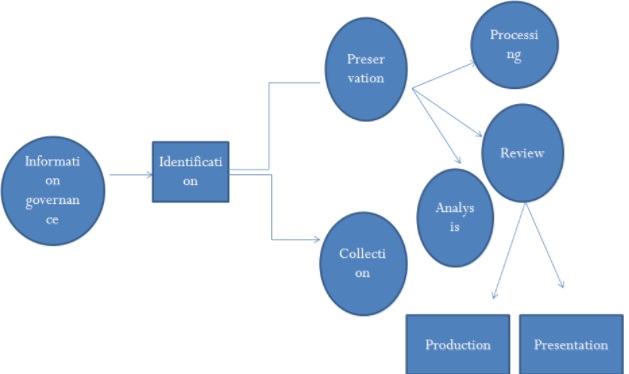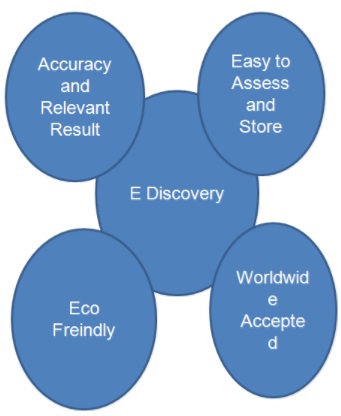In this article, Vidushi Pandey of Sri Ramswaroop Memorial University discusses what is e-discovery? Why don’t we have e-discovery in India?
What is e-discovery
“Electronic discovery (also e-discovery) refers to discovery in legal proceedings such as a litigation, government investigations, or freedom of information Act request, where the information sought is in electronic format (often referred to as electronically stored information or ESI).”[1]
- Electronic information, contrary to manual information, can be stored in a much more efficient and easy manner.
- E-discovery means, ‘any activity in which electronic data is involved’. It refers to any process in which electronic data is needed, placed, and examined which could be beneficial, and can be considered as evidence in criminal and civil cases.
- Paper documents consume a lot of human resources, due to the extensive work involved with it. Electronic information is very easy to be found and also to store. Moreover, virtual data is very easy to preserve and store in computers. It is much more convenient, as people don’t necessarily need to be physically present in order to prove necessary things.
When we look at the history of e-discovery, we can find that it was not available, instead, there was the presence of manual discovery, which implies the exchange information with each other (i.e. both or several of the parties involved). It was the process through which a company or an individual was said to discover which is going to be used as an evidence in the process of litigation or negotiations. The information which is stored in electronic formats is known as Electronically Stored Information (ESI).
There are two types of e-discovery, namely, Civil E-discovery and Criminal e-discovery. They both fulfil different objectives. The way of discovery is totally different in both these cases. Let us discuss this further.
Fields where e-discovery will be useful
Social media
Nowadays social media is playing a significant role in the litigation. Social media is a useful source in e-discovery. For instance, in the process of litigation, the victim party may produce the digital data. Hence the digital data is not that easy to use as evidence. With the initiative of Digital India by our honourable Prime Minister With the progressive initiative taken by our honourable Prime Minister namely ’Digital India’, our Indian judiciary has taken progressive steps as well. So this is the hope for the E-Discovery which can be effectively implemented, and it is desirable that the judiciary considers findings made via E-discovery admissible in court.
Cyber forensics
In India, the Cyber Forensics and Ediscovery evidence are still in the grey areas. We still do not have any Systematic legal framework of e discovery and cyber forensics. India needs to pay special attention to the crucial fields like media forensics, corporate fraud funds, valid sting operations, cyber crime investigation capabilities. India is likely to face challenges in the upcoming future due to the e-courts in India and online dispute resolution.
E-Discovery For Cloud Computing In India
In India, we don’t have a legal framework for Cloud Computing. The national telecom policy 2012 of India tells the importance of legal framework for cloud computing & its regulation. It is related to the legal sector as it involves regulatory issues concern with the litigations. Virtual data rooms for legal compliances in India, and it is based on cloud computing. Data rooms, mergers, legal compliances. This would help in cost benefits and efficiency advantages.
How does e discovery work?
The process of e-discovery is generally followed by legal firms, against the third parties (primarily the opposite parties). The procedures and technologies around e-discovery are quite hectic due to the enormous stock of stored data. Discussing the process of e-discovery and not mentioning electronic discovery reference model (i.e. EDRM) would do injustice to the topic. On the following basis, then diagram given below, explains the process of e-discovery.
Explanation of the above figure
- Information Governance– It is the foundation of the ediscovery process. It stores, controls all the policies, procedures and company’s information.
- Identification– It identifies the potentially relevant information which includes the parties information, facts related to case, laws etc. But they cannot preserve anything, they have to search firstly what is worth keeping.
- Preservation– Now after identifying the relevant information, it is preserved. So that no elimination or alteration can be done with the evidence. In this, a legal team messages or communicate the custodians to save the information.
- Collection– In this a legal process is been taken to gather the information. So that no alteration can be made.
- Processing – This process sends the information for attorney analysis and review.
- Review– It is the most expensive stage which involves the reviewing of the information.
- Analysis– It can be witnessed in every step yet it analyses the content , topics information.
- Production– It determines that how the information should be produced so that it can help the relevant information to become the potential evidence.
- Presentation– It gives the answer to the question that how electronically evidence must be displayed.
What are the advantages of e discovery?
- E-discovery means producing electronically stored information (ESI) to the authorised authority. E-discovery is a process and its unique procedures and practices can affect any businesses that depend or rely on visibility and can control over ESI. Now, there is a unique speciality when it comes to legal e-discovery, as it aids to the process of litigation, in an immediate as well as prolonged manner.
- Due to its universal nature, it gives a competitive edge to focus globally and that is the fact that it is universally accepted.
- It’s very easy to store and carry. The accuracy of computers is that the date and even the time can be detected and it is beneficial for the several kinds of cases.
- Exchanging the information in electronic formats and reducing the cost of printing, therefore making it more eco–friendly.
- It is easy to access to the computer anywhere and at any time. All expenses are transparent and easy to understand.
- Electronic findings can be eliminated but not completely, as it is possible to recover the deleted information.
- Litigators today must be in practice to inculcate the habit of collecting, reviewing and storing electronic materials and data at the beginning of the case. The ambit of ESI is vast and cannot be restricted to social media or emails.
- The paramount concern is that there is a huge shortfall of the litigator’s involvement with the e-discovery. To meet clients e-discovery needs, One has to be quick in adapting the changes occurring in the in the field of technology. E-discovery has its own pros and cons but the chief principle is to take the best out of it.
- Many of them are appraising the changes made by the technology but on the other hand, many of the attorneys oppose to acquire any of the technology changes. E-discovery has brought new opportunities. There are many profits given by the e-discovery.
Can India Have E-discovery?
Yes, India can have e-discovery. However, before pondering about the future let’s focus on the present challenges. They are:
- When we question the existence of e-discovery in India then first and the foremost thing that comes to mind is the free internet access.
- The another thing which should be kept in the mind and that India is a very divergent type of country. The people here are basically divided into 3 groups and that is, upper class, middle class and lower class. And their perspective on the internet is different and unique.
- Some are like upper-class people who are fully aware of the internet and they have no problem in accessing to the computer. But at the same time the lower class people don’t know how to access the computer and middle-class people are reluctant to the change in anything new and most of the India is of a middle-class family.
- According to many surveys and reports, it has been mentioned that India is one of the most prominent emerging usages of the mobile and networks. There is a huge penetration of the internet. Banking has also become nowadays digital.
Challenges to E discovery in India
- Firstly, there are no provisions laid down in any of the acts related to internet policies and its privacy.
- There is a lack of knowledge of technology and literacy rate is also average on the scale.
- We have no special provisions and acts which deal with the protection of e-discovery, privacy rights and laws in India and there is no laws related to e-discovery till now. Indian national privacy policy is still not there and it is crucial need of it.
- Recently an interim order is passed by the Apex Court and according to it only Indian laws and Indian firms can provide e-discovery services in India. This is again a major drawback in implementing the e-discovery records.
- It is going to be hard for the Indians to face the challenges and e-discovery is still taking its shape to form an ideal shape.
- There are still law firms in India which are not aware of the laws in India.
- The first challenge appearing on the surface is the clash between the discovery of demands and protection of electronically stored data.
- The next challenge in e-discovery that whether the information is collected for valid purpose or not.
- The geographical area plays an important role in establishing an e-discovery system.
What changes will Occur if India has E-discovery?
The changes are in the way as India is the largest emerging hub of network and mobile. So there is a light at the end of the tunnel as e-discovery will bring the changes in each and every field. The issues which can be recently seen are like cyber crime and this will give the opportunities in establishing e-discovery. The changes which can be seen are like e-discovery will be systematized in AI ( artificial intelligence ). Then legal answers would be given by them.
The respective changes can be brought are:-
- There is an increased volume of information in all cases.
- Expansion of discovery work.
- Now every data is stored in the cloud.
- The abundance of legal technology and service providers.
Cases relating to e-discovery
In Re Eisenstein– It is the famous case because in this the e-discovery ethics have been told. If you rely on your clients to help with investigations, you must carefully look all gift horses in the mouth. If the client comes up with emails by the other side or any other information, you must investigate the Providence, the chain of custody. If it was stolen, especially if it contains attorney-client information, you must disclose this fact immediately. This can get tricky if a crime was committed by your client. You may have to withdraw in the process. But you certainly cannot hide and use the stolen evidence.[3]
Oracle vs. Google This case focuses on the authenticity of electronic document Review. In this Oracle firstly argues about the perpetrating the discovery concealment by Google which was uncivilized. Oracle then blames the Google for keeping the discovery to itself intentionally which was demanded in the trial. Multi-billion dollar copyright infringement case. Probably the biggest jury trial of the year in 2016. Tens of millions of dollars have been spent on legal fees by Oracle. And yet, a major e-discovery blooper was made by Plaintiff’s counsel in the motion for new trial.[6].
Conclusion
- The scope of legal e-discovery has increased in the recent past years. E-discovery means everything is in the electronic formats. It is the most paramount topic of the present world. To conclude it can be said that e-discovery can bring many opportunities and save time and money. E-discovery is creeping into everywhere.
- E-discovery involves both: the legal field as well as IT also. As technology is evolving, e-discovery is marking its importance.
- For legal solutions, you may go to the website e-discovery Point – e-discovery software. It is a U.S. based e-discovery software which was made to meet the expectations of the clients which provides speed, is easy to access and gives accurate results.
- Another solution can be Caselogistix It is based on the Robust SQL and database foundation. You just have to install this app or you can call on this No. 1-888-728-7677. It is a kind of production platform presenting a quick , simple, and gives the output in more accurate form.
References
- Ed. Handbook of Digital Forensics investigations.Academics.Press P.587
- 2016, BL 107979, Mo. No. SC 95331, (4/5/16)
- 2016
- Cohn vs. Guaranteed Rate, Inc. N.D, CV (N.D. Dec. 8, 2016)
- NO. C 1006561 WHA (ND Case Sept. 27,2016)
 Serato DJ Crack 2025Serato DJ PRO Crack
Serato DJ Crack 2025Serato DJ PRO Crack











 Allow notifications
Allow notifications


